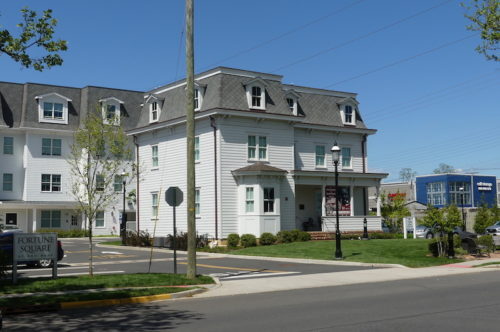
Name: Kathleen Horgan
Age: 68
Where did you grow up: Oyster Bay, Long Island, New York
How long have you been a resident of Red Bank: 14 years
Did you graduate from college: No. However, for years I studied art history at the Ecole du Louvre in Paris, France, and at Wellesley College in Massachusetts.
What do you do for a living: Liaison to the Board of Trustees at amfAR, The Foundation for AIDS Research, New York City, where I have worked for the past 12 years.
Brief description of your responsibilities
Principal responsibilities include structuring and facilitating communication discreetly and diplomatically between the CEO’s office and staff with amfAR’s high-profile Board of Trustees; providing administrative support and assistance to amfAR’s CEO concerning all Board-related matters; planning and coordinating all Board and standing committee meetings.
Party Affiliation: Democrat
How important is party affiliation to you? What does it mean to you to be a member of your party?
There is an important philosophical difference between the Democratic and Republican parties and the divide has become wider in recent years. The Democratic Party’s genuine concern about “the people” speaks to my heart. To me, it’s a party that is inclusive and nurturing. It embraces the middle class, women, minorities, workers, unions, teachers, senior citizens. I am drawn to its humanistic and rational approach to solving the problems of the day and its quest for justice, truth, and fairness.
In brief, what should Red Bank residents expect of a council member?
Integrity, accessibility, accountability, and transparency.
Should healthcare benefits continue to be available to elected officials through the Borough’s insurance coverage?
Yes. Council members receive a small stipend ($3,000 per year) to offset expenditures incurred doing Borough business. Healthcare benefits supplement the shortcomings of the stipend.
How much has the municipal portion of property tax bills, excluding school and county taxes, risen during the terms of Sharon Lee and Kathy Horgan? How do you arrive at those figures?
During my time on Council from 2008 to 2013, the combined average of the municipal portion of the property tax bill rose 33%. The average increase for those years was 5.5%. Here is how you arrive at those figures:
In 2008 the municipal portion of the property tax bill rose 16%;
In 2009, 4%
In 2010, 5%
In 2011: -2%
In 2012: 3%
In 2013: 7% (projected)
These percentages add up to 33%. Divide 33% by 6 (the number of years I’ve been on Council) which gives you the average percentage that the municipal portion of the tax bill rose during those 6 years: 5.5%.
These percentages need to be compared to a statement contained in a brochure published by the New Jersey State League of Municipalities (http://www.njslom.org/tax_brochure.html):
“From September, 2000 to September, 2012, the costs of local government increased 44.3%.”
Do you think that property tax increases are out of control here?
No, not if you consider the factors that drive taxes up: reduction in State aid under the Christie Administration, non-profits that account for 16% of the Borough’s aggregate valuation and which are tax-exempt, high health insurance costs for Borough employees, emergencies like the unexpected snowstorm a couple of years ago and Sandy last year, labor contracts, tax appeals, loss of revenue from fees and uncollected taxes.
What will be your approach to budgeting and taxes?
The Borough’s approach has consistently been to minimize tax increases without reduction in services and to prioritize spending reductions to minimize the impact on those services. We continue to meet State guidelines mandated by the Christie Administration on spending and appropriation levy caps, otherwise our budgets would not have been approved by the State.
What, if any, Borough operations or services should be reduced or eliminated?
The Borough is constantly looking for ways to streamline its operations and still provide essential services which is the job of government. We have consolidated offices so that most departments are working with a skeleton staff who are performing two and three jobs. Our operational costs have remained flat or decreased.
Red Bank has a large number of charities that don’t pay property taxes, accounting for ownership of an estimated 16% of the Borough’s aggregate valuation, far more than nearby towns. What, if anything, should be done to address this?
One of the reasons why Red Bank is a thriving market town and destination center is the fact that we have such a variety of non-profits. Residents and visitors alike can enjoy and access the many amenities that these non-profits offer. By attracting visitors to our town, the non-profits also attract dollars that benefit our tax base.
Regarding the water utility: should it be sold?
No
The water utility generates surpluses that have been used in the past to offset growth in the borough budget, thereby, limiting tax increases. What do you think of that?
The water utility is self-liquidating; the revenue raised from it supports its operations. State statute provides that surplus generated in a municipal utility during one year can be utilized as revenue in the municipality’s current fund the following year. This surplus helps to reduce property taxes which benefits the taxpayer.
What is your view of the Borough’s permitting and licensing procedures for new businesses and existing businesses that wish to expand? Is the process business-friendly?
More needs to be done to cut the red tape. The Council is reviewing new ways to attract and keep businesses in Red Bank.
Chain stores and chain hotels: does their presence in Red Bank diminish the character of our town?
What makes Red Bank special is its small town atmosphere with unique and independently-owned businesses.
Does Red Bank need a downtown parking garage to secure its economic future?
Yes.
Would you vote for a garage that was not fully paid for by private money?
I would vote for a garage that is a revenue source for the Borough which would help to alleviate the burden on taxpayers.
How well do you think Red Bank competes with places like Asbury Park and Pier Village in Long Branch at attracting visitors?
Red Bank is extremely competitive with its neighboring municipalities. Unlike shore towns that do well in the summer, Red Bank is a year-round venue. This is due largely to our two theaters, our arts movie house, large number of excellent restaurants and easy and safe walking.
How do you rate Red Bank’s commitment to conservation and environmental protection? Please be specific.
Considering that Red Bank is only 1.8 square miles, it contains many beautiful parks, open spaces and playing fields within its borders to be enjoyed by residents and visitors: Marine Park, Riverside Gardens Park, Eastside Park, the Westside Pocket Park, Maple Cove, the Bellhaven Nature Area, and the Count Basie Fields.
Since 2008, the Borough has been working to remediate the site of the former incinerator on West Sunset Avenue into what will eventually be called Sunset Park. This 8-acre site of waterfront property along the Swimming River will be developed into parklands and the Council passed a resolution in 2008 confirming that the site would be used only for parklands upon completion of the cleanup.
Red Bank has an active and energetic Environmental Commission whose knowledgeable members are committed to conservation and environmental protection. They are an invaluable resource for the Council.
How do you rate the conditions and maintenance of public facilities such as our parks? What, if anything, needs to be changed?
Red Bank has many public facilities to maintain: Borough Hall, the Senior Center, our parks, parking lots, and reservoirs. These facilities are all labor intensive to maintain. We have cut back on the number of our DPW employees to economize so there are less employees to care for these intricate facilities. As a result, maintenance is reactive rather than proactive.
Anything else you’d like say?






















